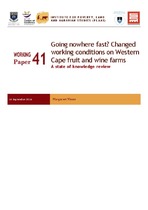Going nowhere fast? Changed working conditions on Western Cape fruit and wine farms: A state of knowledge review
Abstract
This
state
of
the
knowledge
review
sets
out
to
identify
the
main
research
themes
and
findings
in
the
literature
on
labour
relations
and
conditions
on
Western
Cape
fruit
farms
over
the
past
20
years.
The
paper
also
compares
if
and
how
farmworker
livelihoods
have
changed
since
the
heyday
of
Apartheid,
and
the
role
of
the
state
in
these
changes.
While
farmworkers
enjoy
vastly
more
legal
protection
than
in
the
past,
most
may
in
fact
be
worse
off
economically.
This
lack
of
improvement
can
be
attributed
to
the
state’s
contradictory
policy
approach
to
the
sector:
while
it
extended
protection
to
farmworkers
post-‐1994,
it
withdrew
support
from
producers,
especially
regulatory
support
that
previously
forced
them
to
bargain
collectively
with
international
retailers.
Since
1994,
international
retailers
have
increasingly
consolidated
and
formed
buyer
monopolies,
so
producers
now
face
extremely
powerful
bargaining
partners
as
individuals
and
have
therefore
become
price
takers.
To
protect
their
profit
margins,
producers
have
externalised
and
casualised
their
labour
forces,
and
moved
workers
off-‐farm.
The
research
points
to
the
limited
power
of
the
state
to
regulate
employer-‐employee
relations
that
are
embedded
in
global
value
chains,
and
to
the
problematic
of
relying
on
a
narrowly
rights-‐based
approach
to
remedy
working
conditions.
While
aiming
to
regulate
employer-‐employee
relations
within
its
national
jurisdiction,
the
state
has
failed
to
insulate
such
relations
from
the
power
wielded
in
the
global
fruit
value
chain
that
shapes
relations
right
into
the
farmyard.
Such
power
relations
not
only
shape
the
commercial
relations
between
international
retailers
and
local
producers,
but
also
between
local
producers
and
their
workers.
The
review
also
highlights
the
importance
of
analysing
producer
agency
in
contesting
or
circumventing
state
policy
decisions,
which
ultimately
affect
workers’
livelihoods.
Yet,
the
paper
points
out
that
worker
and
producer
responses
to
the
impacts
on
them
have
been
underexplored.

